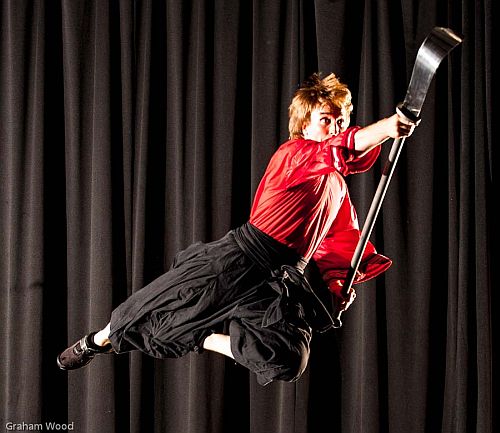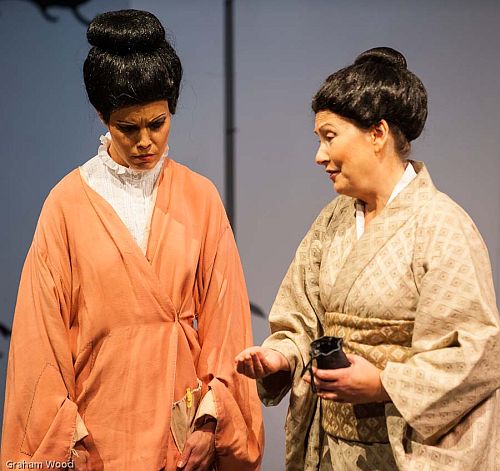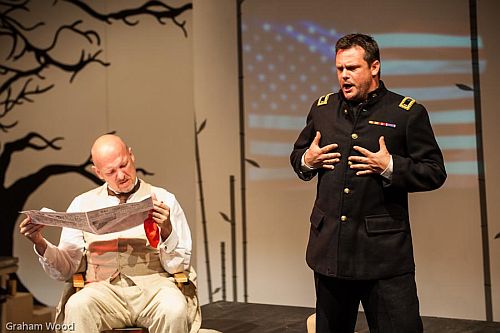 United Kingdom Puccini, Madam Butterfly (2nd Opinion): Soloists, Chorus and Orchestra of New Devon Opera, Paul Foster (conductor) The Northcott Theatre, Exeter 22.7.2012 and The Marquee, Ugbrooke Park 28.7.2012, Courtesy of Lord and Lady Clifford. Sung in English. (BK)
United Kingdom Puccini, Madam Butterfly (2nd Opinion): Soloists, Chorus and Orchestra of New Devon Opera, Paul Foster (conductor) The Northcott Theatre, Exeter 22.7.2012 and The Marquee, Ugbrooke Park 28.7.2012, Courtesy of Lord and Lady Clifford. Sung in English. (BK)
Cast:
Cio-Cio San: Mariya Krywaniuk
Lt. Pinkerton: Pietro Picone
Sharpless: Wyn Pencarreg
Suzuki: Alison Duguid
Goro: Stuart Haycock
Prince Yamadori: Stuart Boother
The Bonze: Roderick Hunt
Kate Pinkerton: Adele Knox
Imperial Commissioner: Gareth Davies
Official Registrar: Adam Temple-Smith
Cio-Cio San’s Mother: Lindy Stephens
The Aunt: Jane Anderson-Brown
The Uncle Yakuside: Steve Brown
The Cousin: Denise Kehoe
Cookie: Stephen Grimshaw
Production:
Conductor and Director of Music: Paul Foster
Director: Martyn Harrison
Production Manager: Graham Wood
Set Design: Martyn Harrison and Graham Wood
Lighting Designer: Bob Reed
Martial Arts Director: Stuart Boother
Costumes: Tony Brett (The Costume Store, Essex) and Flame, Torbay
Wardrobe: Jeanette Nichols, Veronica Webb, Wendy Bushnell
Hair and Make-up: Nancy Hill, Joanna Hedden
Three years ago, almost to the day, I wrote up my first encounter with New Devon Opera – their 2009 La Bohème – and said that the review was ‘a shameless rave.’ Like many other writers, I often work out exactly what I think by deliberately letting my mind free-wheel for a while to expose my true opinions. In this particular case I was initially slightly shocked to discover that I had said that this tiny – and geographically distinctly provincial – company which stages only one production a year, had <Quote> provided a redefinition of the much over-used tag, ‘world class opera.’ <Quote ends.> But the more I thought about this statement, the more certain I became that it was completely true and now, after having seen every subsequent NDO production since 2009, I am delighted to report that my original opinion is still accurate in every respect. I had said:
What the audience had from this mini-Garsington was a completely persuasive production that made them identify with the important elements in the drama, offered them more than decent interpretations of the music and allowed them to enjoy themselves thoroughly. But New Devon Opera’s real secret weapon is something much, much rarer. There’s an enduring sense of good nature emanating from everyone in this company and a perceptible meta-pleasure is gained from watching a team of people deriving their own rewards from giving pleasure to others, rather than simply seeking approval. Together, this team communicates a genuine humanity – both to its members and to the audience – in a most extraordinary way. That’s easily ‘world class’ enough for me.
This year however, because the company has been able to engage two sopranos to share the title role in their Madam Butterfly we have the luxury of two opinions about an NDO production. My colleague Philip Buttall was able to review the opening night in Plymouth on 17th July in which Susan Jiwey sang Butterfly leaving me to report the performances starring Canadian-born singer Mariya Kriwaniuk. PRB’s conclusion was that ‘Madam Butterfly must surely be the company’s best production so far’ and it turns out that I agree with him whole- heartedly.

Since nothing much actually happens in Madam Butterfly in terms of stage action, apart from minimal crowd scenes at the wedding and the Bonze’s denunciation of Butterfly’s conversion to Christianity, the challenge for the opera’s Director is to ensure that the important relationships between the characters are explored very carefully. Typically however Martyn Harrison also takes every opportunity to make his production as visually interesting as possible beginning with an amazingly athletic display of Japanese martial arts technigues performed by Stuart Boother as Prince Yamadori. Further fine touches are to have the relatives and visitors to Butterfly’s house, shower the ground with origami birds and small model buildings and to use a framed picture of Butterfly’s son to overcome the legal problems of finding the two children and chaperones needed to engage live actors for the role. Sets are of course kept simple and portable since the performance venues vary enormously in both size and facilities which means that the expertly handled lighting plot becomes more than usually significant when emphasising mood.
Relationships though are never neglected. Those between Pinkerton, Sharpless, Butterfly, Suzuki, and the marriage broker Goro especially, are all delineated with great finesse, so that the emotional truthfulness of the characters’ interactions is never less than convincing. Obviously enough, some singers are better actors than others in any cast, but here there is never a moment of doubt that anything less than the best possible portrayals from the entire cast are on display here. It’s another tour de force presentationfrom the man who added a live pony and trap for Escamillo’s transport in last year’s Carmen.

Vocally, there is scarcely an uncertain moment. The highlight of the piece for me was the moving third act trio between Sharpless, Suzuki and Pinkerton which was sung to perfection and managed to convey the nature of the tragedy which was drawing towards its inevitable conclusion. Wyn Pencarreg’s Sharpless was not only beautifully acted but was faultlessly sung, conveying a sense that this man was genuinely moved by a situation in which he was helpless to effect any change for the better. The thankless role of Pinkerton – surely verismo’s most graceless anti-hero by a mile – was sung by Pietro Picone and while he sounded initially as if he might have been happier singing the role in his native Italian (although this might be simple projection on my part, since I am generally happier to hear opera sung in its original language) his voice is both powerful, accurate and a joy to hear. Here is a true Italian tenor who I would be more than happy to see in other roles.
Similarly, Suzuki, played by the vastly experienced mezzo Alison Duguid – who recently moved to live in the south-west – combined her customarily polished vocal and acting ability in a beautiful interpretation of her role while Stuart Haycock’s Goro showed an equally refined characterisation. Naturally enough, Mariya Krywaniuk as Butterfly / Cio-Cio San stole the show. Whilst a leading soprano’s appearance is not always important if her voice is good enough, in this case it was good to see a young singer who could convey all the vulnerability of a fifteen-year old trying to be as adult as she can, after being thrust into a truly alien situation. Mariya Krywaniuk’s voice is very delicate and pure and was at its absolute best in ‘One Fine Day / Un Bel Dì.’

Paul Foster’s excellent 21 piece orchestra, this year using Dr. Foster’s own highly skilful orchestral reduction of Puccini’s score, provided their habitually subtle, well-balanced and nuanced accompaniment to the singing. The off-stage Humming Chorus was particularly beautiful in this production – a real tribute to New Devon Opera’s pro-am mix of players and chorus.
This production will be the last one led by New Devon Opera’s Chairman, the apparently tireless Linda Hughes, who has held down the job for the past eight years. She will retire in October of this year and while every member of her good-natured company will certainly wish her well, she will also be very much missed. A very hard act to follow then? Absolutely: exactly like this Madam Butterfly in fact.
Bill Kenny
All pictures © New Devon Opera / Graham Wood
